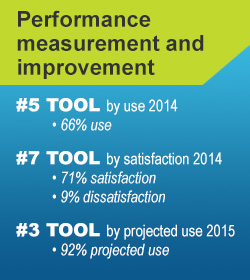
Continuously tracking important data (typically by staff, using an internal data system) for accountability, learning and improvement (e.g. ETO, balanced scorecard, dashboards).
Performance measurement and improvement are systematic processes by which an organization continuously and consistently tracks and applies important program and operations data for the purpose of optimizing its ability to efficiently and effectively advance its desired social impact. The most powerful performance measurement systems are typically a core responsibility of an organization's own staff, who integrate program, financial and organizational data to measure an organization's progress and success.

Read the Full Report
Note: Performance measurement is an ongoing organizational process, as opposed to program evaluations, which are discrete assessments or studies to answer critical questions.
Performance measurement enables an organization to continuously learn and improve, which helps it to achieve better results. The metrics (data points) tracked should be derived from an organization's intended impact and theory of change—what the organization is holding itself accountable for achieving and how to get there. By measuring performance, nonprofits can:
Building Capacity to Measure and Manage Performance
Nonprofits that want to have a great impact on the world also need the capacity to use measurement to improve their performance. Interviews with a wide range of nonprofit leaders and our own work with Bridgespan clients suggest five key elements to measurement success.
Measurement as Learning: What Nonprofit CEOs, Board Members, and Philanthropists Need to Know to Keep Improving
Measurement has become an increasingly hot topic as more funders want to know how their money is being used and as nonprofits undertake evaluations to prove that their programs work. But one of the most important uses of measurement is to improve performance.
Building a Performance Measurement System: A How-To Guide
This practical guide developed by Root Cause provides detailed guidance on developing a customized performance-measurement system, including developing internal dashboards and external report cards, analyzing performance data, creating a culture of learning and continuous improvement, and using data-based evidence to build funder confidence.
Working Hard and Working Well: A Practical Guide to Performance Measurement
In this book, Dr. David Hunter provides history, context, guidance, exercises, and tools for those who wish to move their organizations toward performance measurement.
Our Piece of the Pie: From Data to Decision-Making Data should be a source of strategic value for nonprofit managers. Too often, though, it provides incomplete or misleading information, as was the situation at Our Piece of the Pie (OPP), a Hartford, Connecticut-based youth-services organization. Here's how its leaders tackled the challenge.
Ten Thousand Strong
This case study from Business Strategy Review shares five key lessons from the Goldman Sachs 10,000 Women initiative to create an effective performance-measurement approach and shows why signature philanthropic initiatives should build measurement into their programs from day one.
Portland Public Schools: From Data and Decisions to Implementation and Results on Dropout Prevention
Many school-district leaders in urban areas struggle to reduce dropout rates but find themselves overwhelmed by the problem. There are, however, a few districts making notable progress toward reducing their number of dropouts, including Portland, Oregon, Public Schools. This case study shares strategies for addressing dropout rates.
Great Valley Center: A Case Study in Measuring for Mission Great Valley Center worked to develop a system that would allow the organization to assess performance and share results easily with key stakeholders. The process of putting measures in place helped the group's leaders clarify their strategy and also tested the logic that linked each of their programs to the results they hoped to deliver.
Breakthroughs in Shared Measurement
This report covers 20 social enterprises that developed innovative and coordinated web-based approaches to evaluate their impact across multiple grants and stakeholders.

This work is licensed under a Creative Commons Attribution 4.0 International License. Permissions beyond the scope of this license are available in our Terms and Conditions.